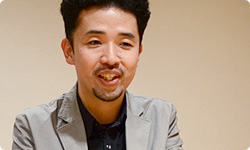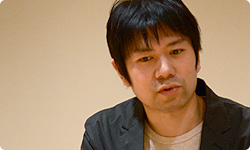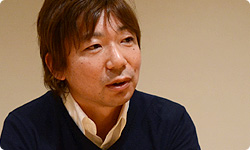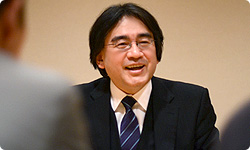4. ''Bioreal''
To ask about it a different way, what would you say is the “essence of Resident Evil”?
Hmm... Having worked on the series for 15 years, that’s difficult to say. A lot of people have made a lot of titles, and many of their different directions have been accepted...
That’s like the way we at Nintendo can’t say what the essence of Mario or of Zelda is in a simple statement. But because there is something that everyone on the team shares, if you depart from it even a little, you can say, “That isn’t like Mario,” or “That isn’t like Zelda.”
Well, I could mention two. One is that Resident Evil is a “Survival Horror Game.” That, was what I thought when I played it as a player, was epoch making, and feel is the foundation of what makes it a Resident Evil game. In making the game this time, we’ve looked back at the past games in the series and revisited the elements on what make this series survival horror. The other is a made-up word traditionally shared within our company.
Traditionally? (laughs)
Yes. That word is “bioreal.” It means real in the world of Biohazard (Resident Evil). What would be a good example?
Viruses. When something happens, you can explain it by the mutation of a virus. That’s bioreal. But if a ghost showed up, that’s no good.

Oh, so zombification is caused by a virus. The dead can’t come back to life some other way, say because of a curse or magic, right?
Exactly.
Whenever we are deciding on ideas for the script or stages, someone will say, “That isn’t biorealistic!” But can anyone state a clear standard to measure it by?
Perhaps it’s a process of gradually spooling out lies. First there’s a virus, and a tiny mutation, and then these horrible creatures start showing up. I feel like neatly building up the story like that, making lies that don’t feel like lies, is bioreal.
The story connects smoothly, so even if a number of impossible things happen at the end, it doesn’t feel unusual to the players.
But where we draw the line can change with the flow of development. We have a meeting at first, but toward the end of development, we’re like, “Put that in, and that, and that, too!” So as to where we draw the line, I feel a lot of it happens by intuition.
But we do scrap some ideas because they aren’t bioreal, so there must be something there.

But we’re also scared of concerning ourselves so much with biorealism that we end up doing the same thing over and over. Even though the series took off in many different directions and the gameplay changed, I think there is something at the core of the series that has been cultivated in the last 15 years. It has gone on for a long time, so each person has his or her own image of it, but the essence of Resident Evil - a virus, entering someplace spooky, and fighting zombies or creatures - hasn’t changed. I feel like Resident Evil leaves our hands and goes into the players’. Even if we want to do something drastically different, we must overcome the image that the players have of Resident Evil. That kind of dialogue with the players is interesting.
You want to contradict their expectations in a good way, so finding just the right touch is important. You don’t want them to think, “I never imagined they’d do that! I hate this!” but rather “I never imagined they’d do that! Cool!”
Right. Our goal this time was a return to the origins of the series as horror, but the game system is new. We intended to remove any dissatisfaction from before. This game came together as a result of all that has built up so far, and fundamental to that is the essence of Resident Evil, of which even we have only a vague sense.
How about you, Hori-san?
Let’s see... I’ve pondered over this for about ten years, too. If you were to draw a line, I suppose it’s a kind of horror that excludes ghosts and splatter.

That’s a restraint you place upon yourselves.
But compared to the other characters, Rachel brings a different presence this time. She’s sort of like a spirit, almost not like a character for Resident Evil, but I think she turned out to be a fresh new character that turned out really well.
Yes. There, we aimed for something that would stand out a bit from the essence of Resident Evil.
But I suppose each person working on it has his or her own feeling toward Resident Evil.
While there may be similarities, it’s impossible that they could all have exactly the same idea of the essence of Resident Evil.

Yes...when it comes to biorealism, too, everyone just says whatever they want! (laughs)
For example, I don’t have any strong opinions about horror, so I just make the games with haunted mansions in mind.
Oh, so that’s the concept behind level design.
That’s right. Likewise, when it comes to the sound, Suzuki-san also operates under his own ideas, I believe.
That’s why his idea about pianos came up this time. As I mentioned earlier, I was surprised at first, too.
It’s just the first thing I intuitively felt. (laughs) If the music were too pretty, it would stray from horror, which makes balance essential. I tried for music that would have an old-style atmosphere but also do something new.